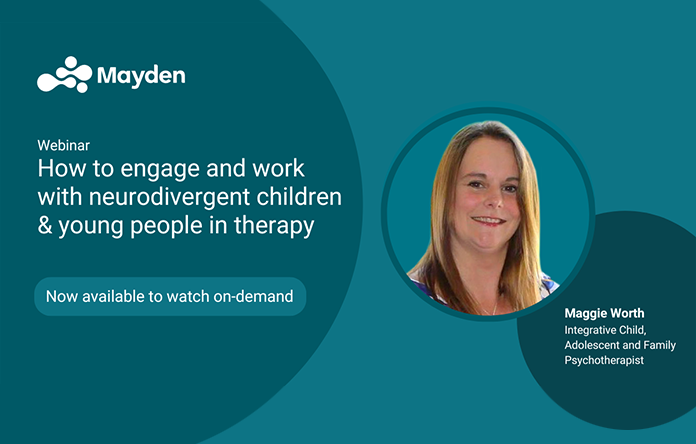
We recently welcomed guest speaker Maggie Worth, Integrative Child, Adolescent and Family Psychotherapist to our webinar series for children and young people’s (CYP) mental health providers.
Maggie gave an insightful talk about the different elements that must be considered when working with and supporting neurodivergent children and young people in therapy.
Catch up on the webinar in full HERE
It is important that everyone in society has an understanding of neurodiversity. Neurodiverse children experience a broad range of mental health difficulties, but traditional blanket approaches to providing them with mental health support are not necessarily effective, and may even cause more harm.
Below are some of the key topics and important considerations for supporting neurodivergent children in therapy sessions.
Conceptualising the adults and family
- Adults and family members will often have faced a huge battle to get their child the mental health support they need.
- Parents sometimes take on altered identities as a result. This helps them articulate the challenges the young person is going through – neurodivergent individuals can often only articulate this with behaviours, rather than conversation.
- Consider your approach to safeguarding – neurodiverse lived experience can be very different, which is something therapists should be aware of when delivering mental health support.
Conceptualising the client
- Therapists must view the whole of the young person, not just the diagnosis. Of course the diagnosis is a core factor, but individuals may present symptoms or behaviours very differently.
- Knowledge of the client’s psychological boundaries is also very important; knowing how the individual sees themselves can help therapists know the optimal approaches for engaging them in therapy.
- Since engaging neurodivergent individuals in therapy presents challenges for the individuals, therapists’ knowledge of their special interests can help regulate them in session if they start to become anxious at any point.
Supporting neurodivergent children within therapy
- Again, within therapy, the therapist should develop a sense of who the individual is and how to engage with them, aiming to create a space that feels safe and judgement free.
- Providing this safe space allows them to be themselves, and help to eradicate their preconceptions that you are trying to ‘fix’ them – therapy is there to help mental health difficulties, but not to fix neurodiverse traits. Therapists can empower clients by helping them to understand their differences and use them in a positive way – with or without a diagnosis. By normalising this, we can help bring down the barriers and reduce psychological tension.
- Neurodivergent clients often struggle to communicate how they feel, so therapists need to read body language to understand when they might be starting to get anxious and when to change approaches within a session
- Be creative/flexible when delivering therapy sessions and incorporate the child’s special interests, for example through art, play, or music. This helps foster full connection and engagement from the individual.
Working with neurodivergent CYP outside of therapy
Working with families and schools outside of therapy can help support neurodivergent children. For example, parenting a neurodivergent child can present some additional challenges – by working with the family, you can see how they have coped in the past and what tools they have used, as well as what could be tried in the future. This can improve the whole experience for the family.
Perceptions around neurodiversity in school settings need to be challenged, and more can be done to both improve everyone’s general understanding, as well as improve long term outcomes. This will enable more therapeutic support to be provided much earlier on in the process, which may reduce challenges later on in life.
Understand your service’s data and improve outcomes for CYP:
iaptus digital care record supports over 70 CYPMH services, including Mental Health Support Teams (MHSTs) working with neurodivergent children and young people.
Explore more resources below:
- How HFEH Mind used iaptus to secure vital funding for a crisis drop-in centre in West London which supports neurodiverse CYP – Watch Video
- Top Tips for MHSTs Supporting Neurodivergent Children and Young People
- Q&A with Nottinghamshire MHST – Adapting to Better Support Neurodivergent Children and Young People
If you would like to find out more about how iaptus can support your CYP service, please get in touch, or book a demo at a time that works for you.
